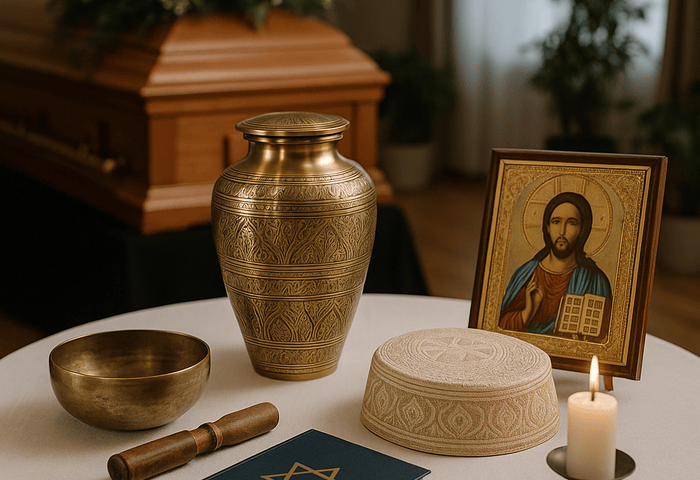Cultural Sensitivity in Funeral Homes

Transparency in Funeral Home Practices
May 13, 2025
Virtual Tours of Funeral Homes
May 13, 2025Roughly 36% of Americans identify with a non-Christian faith or no faith at all, and that number keeps growing, according to Pew Research. Funeral homes aren’t just serving one community anymore, they’re serving dozens. Each brings different customs, beliefs, and expectations to the table.
Cultural sensitivity in funeral homes means more than courtesy. Families expect their traditions to be honored without compromise. They’re not looking for one-size-fits-all services, they want thoughtful, respectful support that reflects their values.
When funeral providers take culture seriously, families notice. And they remember.
Defining Cultural Sensitivity in Death Care
Cultural sensitivity means more than being aware of traditions, it means actively making space for them. Funeral directors who practice cultural competence ask, listen, and adapt. They don’t assume what matters most. They ask what matters most.
It might mean making sure food after the service meets religious dietary laws. It might involve adjusting the timing of a burial or preparing the body in a way that respects spiritual beliefs. Sometimes, it’s as simple as understanding why some families need private prayer or a specific dress code during the service.
Small gestures can carry deep meaning. Getting those details right shows families they’re not just being served—they’re being seen.
Why It Matters for Families and Communities
Grief doesn’t exist in a vacuum. It’s shaped by identity, belief, and belonging. When funeral homes respect that, they help families grieve more freely. There’s less stress, less second-guessing, and fewer painful moments where someone feels misunderstood.
Cultural mistakes do more than create awkward moments. They can feel like disrespect. They damage trust – and they leave families with memories they’d rather forget.
Respecting customs isn’t just good manners. It’s essential to meaningful death care.
Common Cultural Practices Funeral Homes Should Respect
Cultural expectations vary widely, but some practices show up often across funeral planning. Recognizing those patterns helps funeral staff prepare with purpose.
Religious Rites and Ceremonies
Each major faith tradition brings its own structure and symbolism. Directors don’t need to know every detail, but they do need to ask the right questions and recognize what matters.
- Christian funerals often involve viewings, church services, and burial with scripture and hymns.
- Jewish traditions require burial as soon as possible, often within 24 hours. Embalming is generally avoided, and shiva follows the funeral.
- Muslim funerals also call for burial within a day. The body is washed by same-gender family or community members and buried without a coffin, if permitted.
- Hindu rituals usually involve cremation, with family participation in the rites. Ashes may be scattered in a sacred river.
- Buddhist services vary, but often involve chanting, incense, and specific timing around death and cremation.
Missing a key detail—like delaying a burial or mismanaging body preparation, can feel deeply disrespectful to the family.
Family and Community Involvement Traditions
Some cultures center the entire community in the mourning process. Others emphasize close family roles or specific religious leaders.
- Irish wakes may involve storytelling, music, and shared meals in a family home before the funeral.
- Filipino novenas involve nine days of prayer following the burial, often attended by extended family and friends.
- Latino traditions may involve large gatherings, community prayers, and rosary services over multiple days.
- African American funerals often focus on celebration, with eulogies, gospel music, and powerful communal support.
Understanding these traditions helps funeral homes provide space, both literally and emotionally, for the people who show up to grieve.
Unique Customs (Clothing, Music, Food, Rituals)
Culture touches every part of a funeral, from the clothes mourners wear to the music played and food served afterward.
- Chinese funerals may call for white clothing and symbolic items like paper offerings or incense.
- African American services often feature gospel choirs, processions, or expressive tributes through song and spoken word.
- Jewish customs prohibit flowers but encourage donations in memory of the deceased.
- Hindu ceremonies may involve placing flowers and rice near the body and avoiding black clothing entirely.
Food matters, too. Families observing kosher, halal, or vegetarian traditions expect post-funeral meals to match their values.
Challenges Funeral Homes Face in Providing Culturally Sensitive Services
Supporting families across cultures isn’t simple. Funeral directors often juggle emotional, legal, and logistical demands, all while working under time pressure. Honoring diverse funeral customs adds even more complexity.
Cultural sensitivity doesn’t mean memorizing hundreds of traditions. It means listening, staying flexible, and knowing when to ask for help. The biggest challenges usually stem from miscommunication, limited training, or legal conflicts that make it harder to meet urgent cultural needs.
Communication and Language Barriers
Even small language gaps can lead to major misunderstandings. A mistranslation around burial timing or ritual specifics can damage trust instantly.
Some families may speak limited English or prefer communicating in their native language. Without bilingual staff or access to a translator, details get lost—and the risk of disrespecting important customs rises fast.
Offering translated materials or having someone on hand who speaks the family’s language can prevent avoidable mistakes. Clear, culturally aware communication should start with the first call.
Lack of Staff Training or Cultural Awareness
Plenty of funeral homes mean well, but good intentions don’t replace preparation. Without cultural training, staff may unknowingly say or do things that feel dismissive to grieving families.
Missteps range from using the wrong terminology to mismanaging rituals involving the body. For example, assuming embalming is acceptable for every family can alienate those with faiths that forbid it. A small mistake can feel like a huge offense during such a sensitive time.
Training isn’t a one-time task. It needs to be ongoing, tailored, and led by people who understand the nuances of cultural funeral customs.
Balancing Legal Requirements with Cultural Needs
Local regulations don’t always align with religious timelines or practices. That creates tension when families request burial within 24 hours, or when laws around cremation clash with cultural expectations.
Public health rules, paperwork delays, or cemetery restrictions sometimes force funeral homes to make hard calls. Those conversations require empathy, clarity, and creative problem-solving to preserve as much of the family’s tradition as possible.
Legal constraints don’t have to erase cultural respect. They just require more thoughtful navigation.

Best Practices for Culturally Competent Funeral Homes
Meeting the needs of diverse communities doesn’t require perfection, it demands intention. The best funeral homes commit to learning, listening, and making room for difference. They don’t treat culture as a checklist, they see it as central to how families mourn, connect, and remember.
Staff Training and Ongoing Education
Cultural awareness starts with education. Funeral staff should understand key practices across faiths, know how to ask respectful questions, and be comfortable navigating unfamiliar traditions.
Training might include:
- Religious funeral rites and timelines
- Common cultural etiquette and terms
- Proper care and handling of the body based on tradition
- Understanding grief from different cultural perspectives
Partnering with cultural consultants or offering regular internal workshops keeps teams sharp and confident.
Collaboration with Cultural and Religious Leaders
Funeral homes that serve diverse populations should build real relationships with community leaders. Clergy, elders, and cultural advisors can offer guidance, help design rituals, and validate that ceremonies align with family expectations.
Reaching out early builds trust. Including these leaders in planning meetings avoids last-minute corrections and reassures families they’re being truly respected.
Providing Flexible Service Options
Cultural sensitivity means adapting, not just offering a standard menu. Some families need private time with the body. Others may want to incorporate music, prayer, or symbolic acts that aren’t part of conventional services.
Flexible funeral packages that include alternative venues, varied timelines, or family-led rituals allow homes to support customs without compromising legal responsibilities.
Respect lives in the details, like allowing traditional garments, approving sacred items, or offering food spaces that honor dietary rules.
Benefits of Cultural Sensitivity for Families and Businesses
Funeral homes that lead with cultural sensitivity don’t just meet expectations, they earn loyalty. When families feel seen and understood, they remember it. They tell others. They come back when another need arises.
The value goes both ways. Families receive care that honors their beliefs. Funeral providers gain trust, stronger reputations, and referrals rooted in genuine appreciation, not just transactions.
Building Trust and Reputation in Diverse Communities
Respect is noticed. In multicultural communities, word travels fast, especially when a provider gets things right during such a vulnerable time.
A director who accommodates religious funeral rites without hesitation, makes space for cultural funeral customs, and supports diverse end-of-life rituals without judgment becomes more than a service provider. They become part of that community’s support system.
Families recommend funeral homes that treat them with dignity. That organic advocacy builds reputation faster than any advertisement.
Supporting Grief and Healing in a Meaningful Way
Grieving isn’t a process people want standardized. They want it to feel real. When a funeral service reflects their identity, their values, and their family’s heritage, the healing feels deeper.
Small touches, like allowing traditional music, honoring sacred timelines, or offering privacy for prayer—carry emotional weight. Families feel comforted, not just served.
Cultural competence in death care shows families they matter exactly as they are. That comfort stays with them long after the funeral ends.


